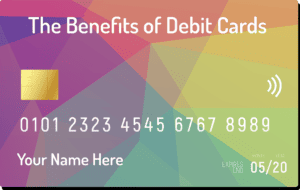Debit cards have some great benefits to their use. They can help keep your finances easy to interpret, and help prevent overspending and negligence. While debit cards usually don’t offer as many incentives as credit cards, they have some great features that can help you spend more responsibly. Transactions are taking place online more and more each year. Now is a good time to put away your cash and checks and make the switch to cards. Here are some good reasons why using a debit card might be right for you and your finances.
The Convenience
Accepted at Most Businesses
Using a debit card is easier now than ever before. Because most businesses accept cards, you can ditch the cash and rely on cards to pay your way through whatever you might encounter. With a reliable debit card in your pocket you can avoid carrying excess cash or cards. If you need cash on occasion, you can use your debit card to access a local ATM. Just make sure that it’s in your bank’s ATM network, or you might have to pay an ATM fee to withdraw money.
Smart Wallet Compatible
Most debit cards can also be added to your preferred smart wallet and accessed easily from your smartphone. Using a card on your smart wallet is a convenient way to pay. Storing your debit card in your smart wallet can also prevent you from losing it or having it stolen. It’s still important to have at least one physical card with you, as not all businesses accept tap to pay, but storing a few of your cards in your smart wallet can make your wallet lighter without losing out on any utility.
Learn how to add your MSB debit card to a mobile wallet here.
Linked to Your Bank
Your debit card is linked directly to your bank account, which can help you keep track of your purchases. You can stay on top of your money as soon as it’s spent, rather than waiting for your credit card payments to post. Consolidating your spending to fewer cards helps you spend less, especially when you’re pulling from your account instead of from a credit card.
The Savings
Using your debit card can help you save money. While there are often incentives for using credit cards for purchases, misusing your credit can negatively impact your credit score and your finances. Debit cards don’t allow you to carry a balance, so there is no worry about keeping up with payments or accumulating interest. You are likely to spend less when you are drawing on money directly from your bank account without the buffer that credit cards offer.
No Costly Requirements.
Additionally, one benefit of most debit cards don’t have annual fees or minimum monthly amounts, so there is no need to worry about making consistent purchases and payoffs. Instead, your debit card patiently waits for you. In our lightning-fast attention-grabbing world, it’s nice to have a card that doesn’t make demands of you.
The Security
Debit cards often have security features that you can utilize to prevent fraud and protect your money.
Card Alerts
Setting up alerts on your debit card helps you manage your money and keep it safe. You can get a text each time your card is used so that you always know when there is activity on it. This can help you spot fraud and act quickly when you notice suspicious charges. In addition to being an excellent fraud prevention tool, card alerts can help you save money. You can use them to keep tabs on auto renewing subscriptions and cancel them when they aren’t serving you anymore. Alerts can help you prevent charges from getting buried in your credit card statement.
Learn how to set up card alerts here.
Card Limits
Most banks will allow you to set daily limits on your debit card. This helps you to minimize fraud if your card is stolen, limiting how much your account can be charged in any given day. Setting limits on your card can also help you stick to a budget, preventing you from overspending. Having a firm limit set on your spending can attune you to the true cost of impulsive purchases. And, for when you need to raise your limits briefly, contacting your local bank is easy.
The Caveats
Debit cards are an excellent way to access money, but they do have some caveats to their usage.
You Need Money in Your Account
Because your debit card pulls directly from your bank account, you’ll need to have funds there to make purchases. This can be a downside if you don’t have easy access to your bank account, or you need money in a pinch. It can be a helpful way to keep up with your budget, as long as you’re careful not to overdraft your account.
You Need to Memorize Your PIN
To access your debit card, you’ll need to memorize the four-digit PIN number for in-person purchases. Depending on your bank, your PIN might be autogenerated when you activate your card. Some banks allow you to pick your own PIN or give you the option to change it. Regardless of the number, you’ll need to memorize it to use your card securely.
SECURITY TIP: Choose a PIN that’s hard to guess. Avoid birthdays, any part of your SSN, and any easy combinations like 0000 or 1234.
You May Need to Raise Your Limit for Larger Purchases
Debit cards have daily limits that are usually set by your bank. Usually, standard card limits are high enough for daily purchases. But, if you’re working on a big project, such as furnishing a home or purchasing a vehicle, then you might be held up briefly by the payment. If you ever need to make a larger purchase than usual, you just contact your bank so that they can raise your card limit for a day.
Can Overdraft Your Account (if you’re not careful)
Your debit card is linked directly to your bank account, accessing that balance for any purchases. If you intend to use your debit card frequently, it’s important to pay attention to your balance to make sure that you don’t overdraft your account. As long as you keep track of your available balance, then you’ll be fine.
Closing
The benefits to debit card usage easily outweigh the costs. As long as you pay attention to your available cash then you’re all set to spend your money in a smart and responsible way.
It’s never too late to get a debit card. Give your banker a call through Video Connect to sign up for a debit card today:


